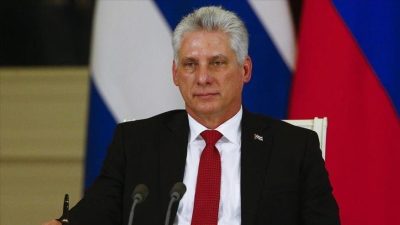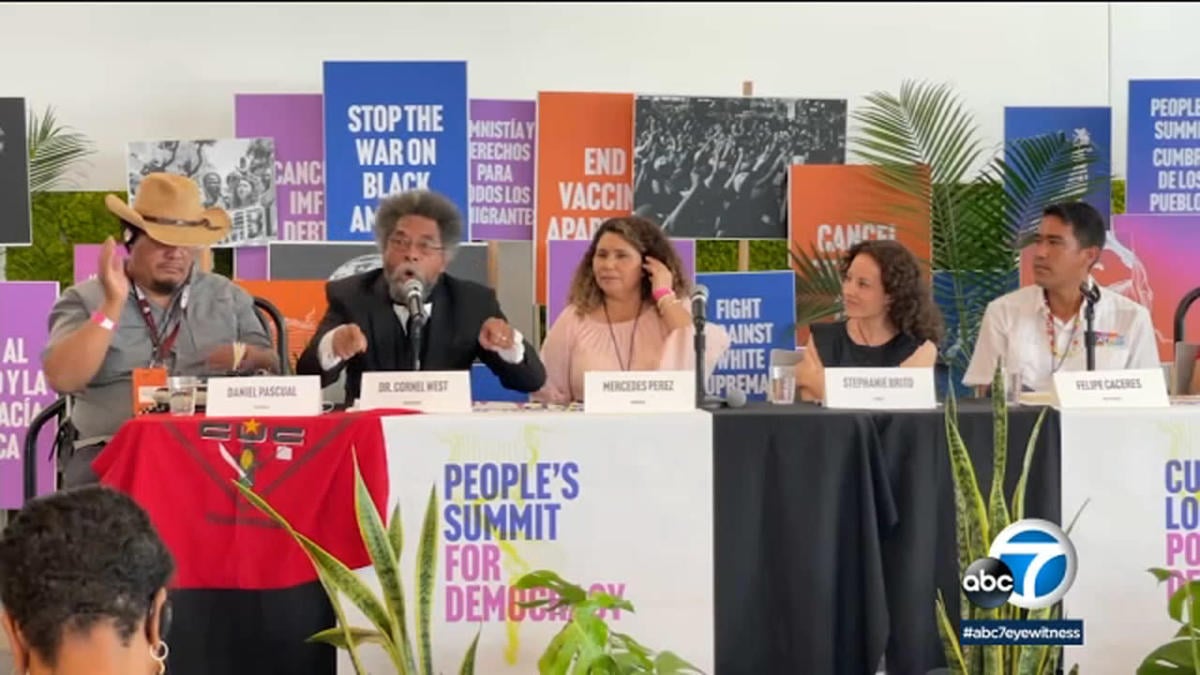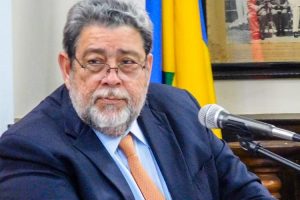Summit of the Americas Reaffirms Decline of United States Influence
Many leaders within the Southern Hemisphere refused to attend a meeting where the agenda was set by President Joe Biden

All Global Research articles can be read in 51 languages by activating the “Translate Website” drop down menu on the top banner of our home page (Desktop version).
To receive Global Research’s Daily Newsletter (selected articles), click here.
Visit and follow us on Instagram, Twitter and Facebook. Feel free to repost and share widely Global Research articles.
***
A failed Summit of the Americas convened by the United States administration of President Joe Biden further revealed the waning geopolitical authority of Washington and Wall Street.
This event held between June 7-10, was boycotted by many governmental leaders from Central and South America along with the Caribbean due to the deliberate exclusion by the Biden administration of the Republic of Cuba, the Bolivarian Republic of Venezuela and Nicaragua.
Even leaders in the region which have maintained close ties with the U.S. refused to attend. There was an immediate outcry from governmental and mass organizations demanding that those invited should not attend on principle.
The confab was the first of its kind held in the U.S. since 1994 when President Bill Clinton was in office. Obviously, the governments and civil society groupings realized that the aim of the meeting was to reassert Washington’s imperialist role throughout the entire Western Hemisphere.
Over the last two decades, the People’s Republic of China and the Russian Federation have enhanced their diplomatic and economic relations with Southern Hemispheric states and peoples. During this time period, the volume of trade and direct aid from Washington has declined significantly amid revolutionary upheavals throughout South America and the Caribbean which have been largely carried out through mass demonstrations, general strikes and left-wing oriented electoral campaigns.
Under the previous administration of President Donald Trump, the attitude towards the Southern Hemisphere was one of open contempt and attempted intimidation. However, the Biden presidency has largely maintained the same foreign policies imposed by Trump.
Even the right-wing government of Brazil under President Jair Bolsonaro had to be coerced into making an appearance at the summit in Los Angeles. Accounts from corporate media sources indicate that Bolsonaro, who was supported by Trump and adopted several of his policy recommendations related to race relations, the environment, women and gender affairs, had initially said he was not interested in attending. There were statements by the Brazilian president questioning the legitimacy of the Biden administration.
Time magazine, a longtime mainstream publication which is widely circulated in the U.S., clearly described the Los Angeles summit as a failure for the Biden administration. Citing the rapid and disastrous withdrawal from Afghanistan in August 2021 and the ineffective war policies towards Russia as it pertains to the Ukraine conflict, has significantly reduced the weight of U.S. influence throughout Latin America, the Caribbean and other parts of the world.
Eloise Barry writes in the Time article that:
“Trade between China and the Caribbean and Latin America has increased from $18 billion in 2002 to nearly $449 billion in 2021, making it the top trading partner of Brazil, Chile, Peru, and Uruguay. China has upped arms sales and engaged 21 countries in the region in its Belt and Road Initiative, a key tenet of Beijing’s foreign policy that uses infrastructure and investment programs to promote economic integration and boost its diplomatic clout.”
The Biden administration and others prior to this time period, have designated China as a main strategic competitor. While the U.S. under successive regimes have engaged in imposing sanctions, destabilization programs, proxy wars, aerial bombardments and ground invasions into countries from the former Yugoslavia, to Afghanistan, Iraq, Libya, Syria, Yemen, Palestine, Iran, Haiti, Zimbabwe, Ethiopia, Bolivia, the Russian Federation, among others, China has been utilizing its national wealth in eliminating poverty and establishing partnerships within various geopolitical regions.
Coinciding with the hostile foreign policy of Washington and Wall Street, the U.S. domestically has continued to super exploit and marginalize the workers and oppressed peoples. The repressive apparatus of the state has intensified with the militarization of the police and the vast growth in the prison-industrial-complex. The dislocation and social turmoil created by Washington in the wake of their interventions has exposed the actual character of the ruling class.
Politico, whose assessment of the summit was not as grim as that of Time, spoke to the contradictions prevalent in the city of Los Angeles. Christopher Cadelago and Jonathan Lemire observed:
“Outside, however, the unmistakable smell of urine wafted through the warm night air. The deteriorating condition of downtown Los Angeles — where rows of tents housing the homeless lined the street—didn’t go unnoticed by the foreign dignitaries. Nor did the 7-Eleven where store clerks keep the door locked during operating hours because they’ve been robbed so often.”
These social conditions undoubtedly made an impression on the delegates. Neither the Democrats or Republicans have put forward policies to curb inflation, the decline of real wages and the worsening violence exemplified by racist attacks and mass shootings on a daily basis.
Caribbean Leaders Address the Peoples of the Americas
A Summit of the Peoples took place in Los Angeles as an alternative to the Biden administration’s attempt to make inroads against China and Russia on the international scene. President Miguel Diaz-Canel sent a message to the gathering saying that although Cuba was not present in Los Angeles, their voices were being heard.
Peoples Summit of the Americas in Los Angeles (Source: Abayomi Azikiwe)
The Cuban leader said in a written address:
“Wherever peoples are struggling, Cuba will be there. And wherever Cuba is, peoples will be struggling. The struggle that we are sharing today dates back centuries, at the cost of the blood of some of the best sons and daughters of the Greater Homeland. That struggle is waged against the powerful neighbor’s re-colonizing attempts of our American nations. It is waged against the spirit of the Monroe Doctrine that continues to guide the U.S. and its political approach to our region. It is waged against the imperial policies of sanctions and penalties for countries that will not yield to such designs. It is waged against the U.S. politicians’ aspirations to become gendarmes and supreme judges, determined to establish who should be our leaders and even our civil society.”
Image on the right: St. Vincent and the Grenadines Prime Minister Ralph Gonsalves (Source: Abayomi Azikiwe)
The heads-of-state of important countries in the region such as Mexico, Guatemala, El Salvador, Honduras and St. Vincent and the Grenadines refused to attend despite the pressure from Washington. Some, like Mexico, sent their foreign minister. The Prime Minister of St. Vincent, Dr. Ralph Gonsalves, maintained his refusal to attend the summit in Los Angeles.
Gonsalves said over the national radio network:
“I’m not going because I don’t see what is to be gained from going. And as presently advised, as I say, I’m not supporting or sending anybody. Because if you invite me to come to your house and I say, as a matter of principle I ain’t coming because you shouldn’t be excluding people, how could I then send somebody else.”
The St. Vincentian prime minister circulated letters along with mass organizations throughout the regions in an attempt to persuade Caribbean states from attending. Although the Caribbean Community (CARICOM) had indicated they would not attend unless the Biden administration shifted its policy, Gonsalves indicated:
“That some leaders will attend while others will stay away or send lower-level delegations…. [W]hy are we fighting these 20th century battles and conflicts in this third decade of the 21st century? Our American friends are wrong on this.”
In another speech to the civil society organizations of Cuba, which were also excluded from the Ninth Hemispheric Summit in Los Angeles, President Diaz-Canel emphasized:
“The philosophical dogma that has always accompanied that insatiable ambition is the so-called Manifest Destiny, a deeply rooted racist and supremacist belief whose leading concept relies on the interventionist and unacceptable Monroe Doctrine. Without renouncing any of these two concepts, the U.S. Government convened the Ninth Hemispheric Summit in the city of Los Angeles, with discriminatory attendance and insufficient regional representation. In the case of Cuba, the exclusion was not only against the government, but also against the representatives of the civil society and social actors, including our youths. The United States is no longer satisfied with deciding who and how should be the Cuban government. Now they attempt to determine who the representatives of the civil society are, who are the legitimate social actors and who are not. Allow me to revisit history, for it usually hides so many lessons…. That Conference failed and it is affirmed that the Cuban decisively contributed to that….”
These developments should serve as a wake-up call to the oppressed nations and peoples of the world that the trajectory of U.S. imperialist policy has not changed under the current administration in Washington. Progressive and revolutionary states in alliance with popular organizations of the workers and oppressed must unite in order to resist the incessant political and economic pressures still being exerted by the U.S.
*
Note to readers: Please click the share buttons above or below. Follow us on Instagram, Twitter and Facebook. Feel free to repost and share widely Global Research articles.
Abayomi Azikiwe is the editor of the Pan-African News Wire. He is a regular contributor to Global Research.
Featured image: Cuban President Miguel Diaz-Canel speaking (Source: Abayomi Azikiwe)



